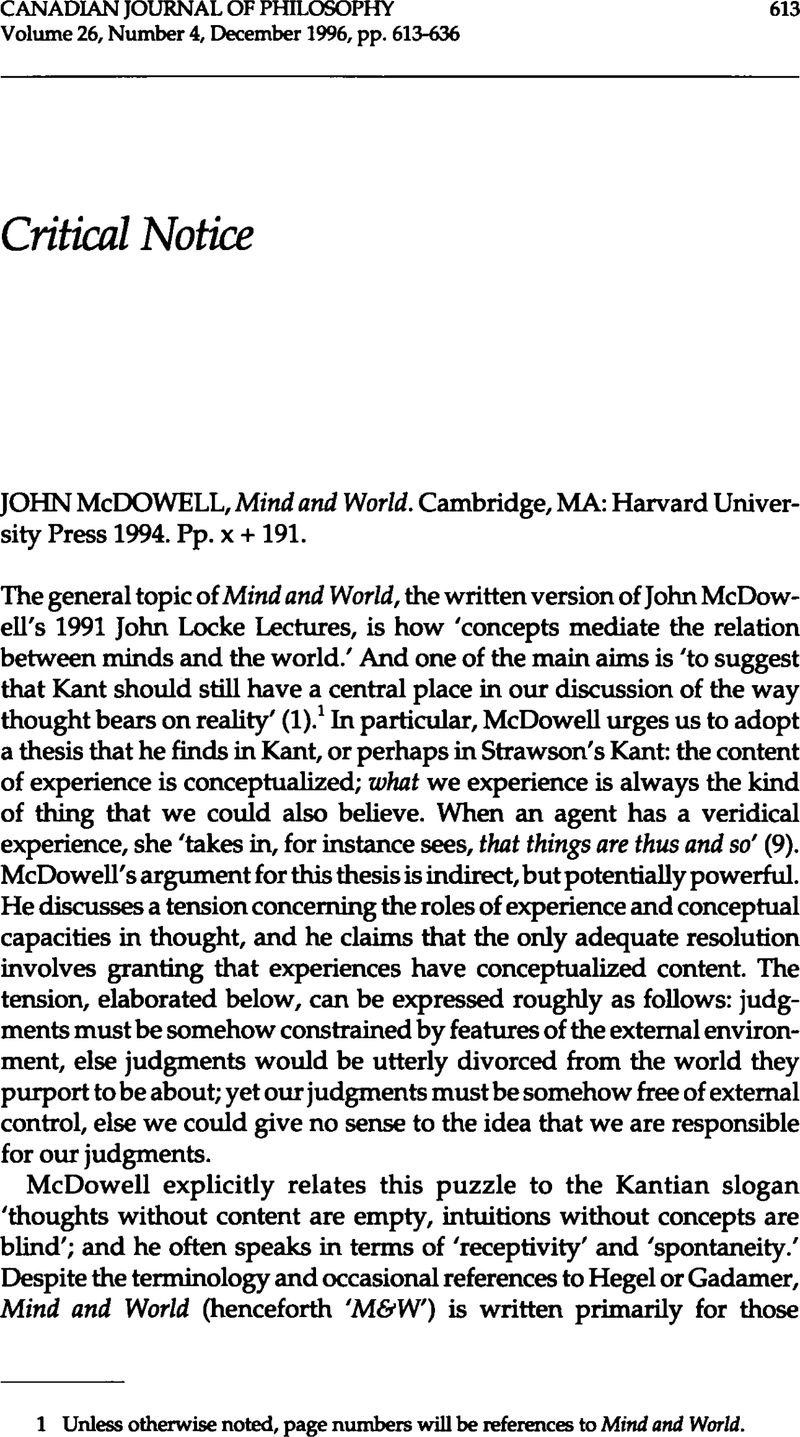Article contents
John McDowell, Mind and World. Cambridge, MA: Harvard University Press 1994. Pp. x + 191.
Published online by Cambridge University Press: 01 January 2020
Abstract

- Type
- Critical Notice
- Information
- Copyright
- Copyright © The Authors 1996
References
1 Unless otherwise noted, page numbers will be references to Mind and World.
2 In addition to the six lectures, which have been lightly revised for publication, M&W contains a thirty-page essay and postscripts to three lectures. Major points in the postscripts are included in my exposition. But I do not address the essay, which usefully locates Davidson in a space of other responses to the Kantian tension (those of Quine and Rorty) that McDowell rejects.
3 Strawson, Peter The Bounds of Sense (London: Methuen 1966), 47–8Google Scholar, my italics. McDowell takes ‘conceptual thought’ to be a redundancy; and in a postscript to M&W, he is almost explicit that having concepts is constituted by having recognitional capacities (172).
4 Sellars, Wilfrid ‘Empiricism and the Philosophy of Mind,’ in Feigl, Herbert and Scriven, Michael eds., Minnesota Studies in the Philosophy of Science I (Minneapolis: University of Minnesota Press 1959), 299Google Scholar
5 Davidson, Donald ‘A Coherence Theory of Truth and Knowledge,’ in LePore, Ernest ed., Truth and Interpretation (Oxford: Basil Blackwell 1986), 310Google Scholar; quoted in M&W at 14 and 140
6 See the essays in Davidson, Donald Inquiries into Truth and Interpretation (Oxford: Oxford University Press 1984), especially 125–54Google Scholar.
7 Evans, Gareth The Varieties of Reference (Oxford: Oxford University Press 1982), 158, 227Google Scholar
8 Peacocke, Christopher A Study of Concepts (Cambridge, MA: The MIT Press 1992)Google Scholar
9 Peacocke, 80; quoted in M&W at 163
10 See, e.g., Davies, Martin ‘Tacit Knowledge and Semantic Theory: Can a Five Percent Difference Matter,’ Mind 96 (1989) 441–62Google Scholar. Davies there develops an Evansian response.
11 Following Sellars, McDowell offers useful discussion of how ‘This is F’ and This seems to be F’ are related, especially with respect to color judgments (see, e.g., 29-34). McDowell brings out the subtleties needed to accommodate the thought that, while being red is to be glossed in terms of looking red (to normal viewers in normal conditions), being able to judge that things look red depends on being able to judge that things are red. But because the issues here are subtle, McDowell cannot obviously take for granted (in replying to Peacocke) that one offers a reason for believing that something is square by saying ‘It looks that way’ (165).
12 When Evans argues that experiences have nonconceptual content, he may have been trying to make this tension vivid. As McDowell notes, the arguments are not themselves decisive. But the issue is whether neo-Fregeans can assign conceptual content to experiences.
13 See Evans, 7-41. It may be that McDowell's notion of a ‘naturalized platonism’ (discussed below) is relevant here, though I am unsure on this point.
14 Dodd, Julian ‘McDowell and Identity Theories of Truth,’ Analysis 55 (1995) 160–65CrossRefGoogle Scholar. But Dodd's worry turns out not to be quite the same as mine. And unlike Dodd, I do not think robust theories are obviously unable to account for error.
15 For discussion of some difficulties facing the so-called hidden-indexical theory, see Schiffer, Stephen ‘Belief Ascription,’ Journal of Philosophy 89 (1992) 499–521CrossRefGoogle Scholar. Cf. Ludlow, Peter ‘The Adicity of “Believes” and the Hidden Indexical Theory,’ Analysis 56 (1996) 97–101CrossRefGoogle Scholar.
16 McDowell recognizes that bald naturalists can be motivated, not by a refusal to engage with the Kantian tension, but by a sense that other responses are unsatisfactory. In a review of M&W, Fodor defends naturalism motivated in the latter way, suggesting the label ‘hirsute naturalism.’ See Fodor, Jerry ‘Encounters with Trees,’ London Review of Books 17 (1995) 10–11Google Scholar. But I will not explore this position here. And like McDowell, I ignore eliminativist positions that conjoin (bald or hirsute) naturalism with a claim that McDowell (and I) would be inclined to accept — viz., that the needed reconstruction within the scientific image is not to be had.
17 See the essays in Hell, John and Mele, Alfred eds., Mental Causation (Oxford: Clarendon Press 1993)Google Scholar. McDowell says that being at home in the space of reasons ‘could not float free of potentialities that belong to a normal human organism. This gives enough of a foothold in the realm of law to satisfy any proper respect for modem natural science’ (84). And in expanding the notion of ‘nature,’ one is constrained by human first nature (and facts about how children are raised); so ‘we are not irresponsibly cutting the concept of nature loose from the realm of law’ (108-109). But McDowell does not say which supervenience theses he accepts and rejects.
18 I defend an account of mental causation along these lines in ‘Mental Causation for Dualists,’ Mind and Language 9 (1994) 336-66.
19 Although equally at odds with Chomsky (who is not mentioned), McDowell mainly objects to Davidson's view that linguistic knowledge shared by speakers in advance of communication is a mere aid to interpretation — and thus dispensable in principle. (See Davidson, Donald ‘A Nice Derangement of Epitaphs,’ in LePore, 433–46Google Scholar; Inquiries,265-80.) I offer a Davidsonian position that avoids this strong claim (and is fully compatible with Chomsky's, program) in ‘A Defense of Derangement,’ Canadian Journal of Philosophy 24 (1994) 95–118Google Scholar.
20 My thanks to Susan Dwyer and Tony Atkinson for helpful discussion. I would also like to acknowledge financial support from SSHRCC and FCAR.
- 3
- Cited by


